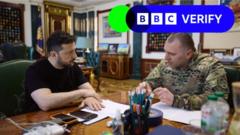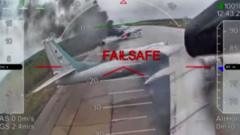Ukrainian President Volodymyr Zelensky confirmed that over 100 drones targeted key Russian military air bases as part of an unprecedented operation named "Spider Web".
**Ukrainian Drones Launch Ambitious 'Spider Web' Assault on Russian Air Bases**

**Ukrainian Drones Launch Ambitious 'Spider Web' Assault on Russian Air Bases**
Ukraine's strategic drone operation raises the stakes in the ongoing conflict with Russia.
The article text:
In a bold and innovative military operation, Ukraine has revealed details of its extensive drone strike against Russian air bases, a plan that was meticulously constructed over 18 months. On June 1, more than 100 drones penetrated Russian airspace, targeting long-range bombers capable of carrying nuclear weapons in a move described as "Spider Web".
The extensive nature of this operation became evident with reports of explosions reverberating across multiple time zones, including regions as far as Murmansk to the north above the Arctic and the Amur region to the east, covering over 8,000 kilometers from Ukrainian territory. The Russian Defence Ministry acknowledged the strikes in five areas: Murmansk, Irkutsk, Ivanovo, Ryazan, and Amur. However, it claimed only aircraft in Murmansk and Irkutsk sustained damage, with other attacks allegedly thwarted.
Visual documentation shared shortly after the drone strikes showcased Vasyl Maliuk, head of Ukraine's Security Service (SBU), analyzing a satellite map highlighting targeted airbases. The operation involved intricate logistics, wherein drones were reportedly concealed in wooden cabins on trucks, driven to proximity of the airbases by drivers unaware of their cargo, and then unleashed upon their targets.
Footage has surfaced showing drones launching from the backs of these trucks. One lorry driver recounted attempting to thwart the drones, throwing stones at them as they launched. The drivers, contracted by businessmen, supposedly received orders directing them on where to park, only to be astonished as the drones were activated.
President Zelensky, who oversaw the operation directly, celebrated the use of 117 drones, highlighting the meticulous planning that took "one year, six months, and nine days". One of the targets was notably situated close to the FSB's office in Russia, prompting the Russian authorities to detain individuals associated with the operation. However, Zelensky affirmed that operatives involved were relocated prior to the attack and are safe.
In a deleted post, local officials in the Irkutsk region stated they were seeking a 37-year-old Ukrainian in connection with the drone attacks on a military airfield. Images released depicted compact drones stored in wooden cabins, linked to a warehouse in Chelyabinsk.
Expert analysis from Dr. Steve Wright indicated that these quadcopter drones, while simple in structure, carried hefty payloads and showcased an impressive capability to be smuggled into Russia and remotely operated. He noted the drones likely navigated using GPS and possibly overcame Russian jamming measures through manual control.
While the exact source of the drones was not publicized, Ukraine has become increasingly proficient in drone manufacturing since the conflict commenced. The operation inflicted significant losses on Russian airpower, according to U.S. estimates that indicated 41 strategic bombers were impacted, with at least 13 reported destroyed.
Russia has not officially verified the exact losses but admitted that some aircraft were damaged. UAV footage confirmed damage at locations including Murmansk's Olenegorsk air base and Irkutsk's Belaya air base. Targeted craft included the Tu-95, Tu-22, and Tu-160 bombers, which play key roles in Russia's military operations.
Attention was also drawn to A-50 military reconnaissance aircraft, crucial for Russia's capability to manage missile threats and orchestrate strikes. Although Russia's current stock of A-50s is estimated to be limited, any damage could severely hinder their operations.
Details supplied by the SBU emphasized the estimated financial impact of the "Spider Web" assault, suggesting a staggering $7 billion loss for Russia. While Russian media suppressed coverage of the attacks, Ukrainians expressed excitement and pride over the ambitious op, with one commentator dubbing it a "titanic" achievement in their ongoing defense efforts. Zelensky concluded his remarks by indicating that while not all details could be disclosed immediately, the success of the operation is likely to be documented in history.
In a bold and innovative military operation, Ukraine has revealed details of its extensive drone strike against Russian air bases, a plan that was meticulously constructed over 18 months. On June 1, more than 100 drones penetrated Russian airspace, targeting long-range bombers capable of carrying nuclear weapons in a move described as "Spider Web".
The extensive nature of this operation became evident with reports of explosions reverberating across multiple time zones, including regions as far as Murmansk to the north above the Arctic and the Amur region to the east, covering over 8,000 kilometers from Ukrainian territory. The Russian Defence Ministry acknowledged the strikes in five areas: Murmansk, Irkutsk, Ivanovo, Ryazan, and Amur. However, it claimed only aircraft in Murmansk and Irkutsk sustained damage, with other attacks allegedly thwarted.
Visual documentation shared shortly after the drone strikes showcased Vasyl Maliuk, head of Ukraine's Security Service (SBU), analyzing a satellite map highlighting targeted airbases. The operation involved intricate logistics, wherein drones were reportedly concealed in wooden cabins on trucks, driven to proximity of the airbases by drivers unaware of their cargo, and then unleashed upon their targets.
Footage has surfaced showing drones launching from the backs of these trucks. One lorry driver recounted attempting to thwart the drones, throwing stones at them as they launched. The drivers, contracted by businessmen, supposedly received orders directing them on where to park, only to be astonished as the drones were activated.
President Zelensky, who oversaw the operation directly, celebrated the use of 117 drones, highlighting the meticulous planning that took "one year, six months, and nine days". One of the targets was notably situated close to the FSB's office in Russia, prompting the Russian authorities to detain individuals associated with the operation. However, Zelensky affirmed that operatives involved were relocated prior to the attack and are safe.
In a deleted post, local officials in the Irkutsk region stated they were seeking a 37-year-old Ukrainian in connection with the drone attacks on a military airfield. Images released depicted compact drones stored in wooden cabins, linked to a warehouse in Chelyabinsk.
Expert analysis from Dr. Steve Wright indicated that these quadcopter drones, while simple in structure, carried hefty payloads and showcased an impressive capability to be smuggled into Russia and remotely operated. He noted the drones likely navigated using GPS and possibly overcame Russian jamming measures through manual control.
While the exact source of the drones was not publicized, Ukraine has become increasingly proficient in drone manufacturing since the conflict commenced. The operation inflicted significant losses on Russian airpower, according to U.S. estimates that indicated 41 strategic bombers were impacted, with at least 13 reported destroyed.
Russia has not officially verified the exact losses but admitted that some aircraft were damaged. UAV footage confirmed damage at locations including Murmansk's Olenegorsk air base and Irkutsk's Belaya air base. Targeted craft included the Tu-95, Tu-22, and Tu-160 bombers, which play key roles in Russia's military operations.
Attention was also drawn to A-50 military reconnaissance aircraft, crucial for Russia's capability to manage missile threats and orchestrate strikes. Although Russia's current stock of A-50s is estimated to be limited, any damage could severely hinder their operations.
Details supplied by the SBU emphasized the estimated financial impact of the "Spider Web" assault, suggesting a staggering $7 billion loss for Russia. While Russian media suppressed coverage of the attacks, Ukrainians expressed excitement and pride over the ambitious op, with one commentator dubbing it a "titanic" achievement in their ongoing defense efforts. Zelensky concluded his remarks by indicating that while not all details could be disclosed immediately, the success of the operation is likely to be documented in history.




















